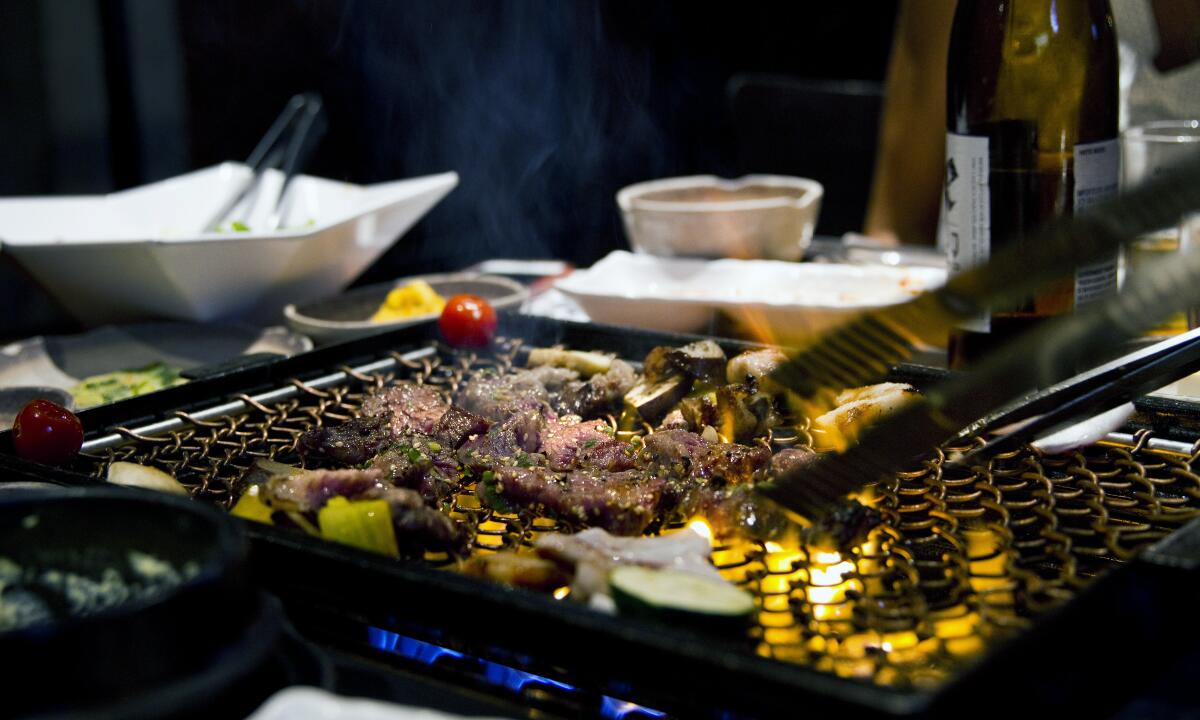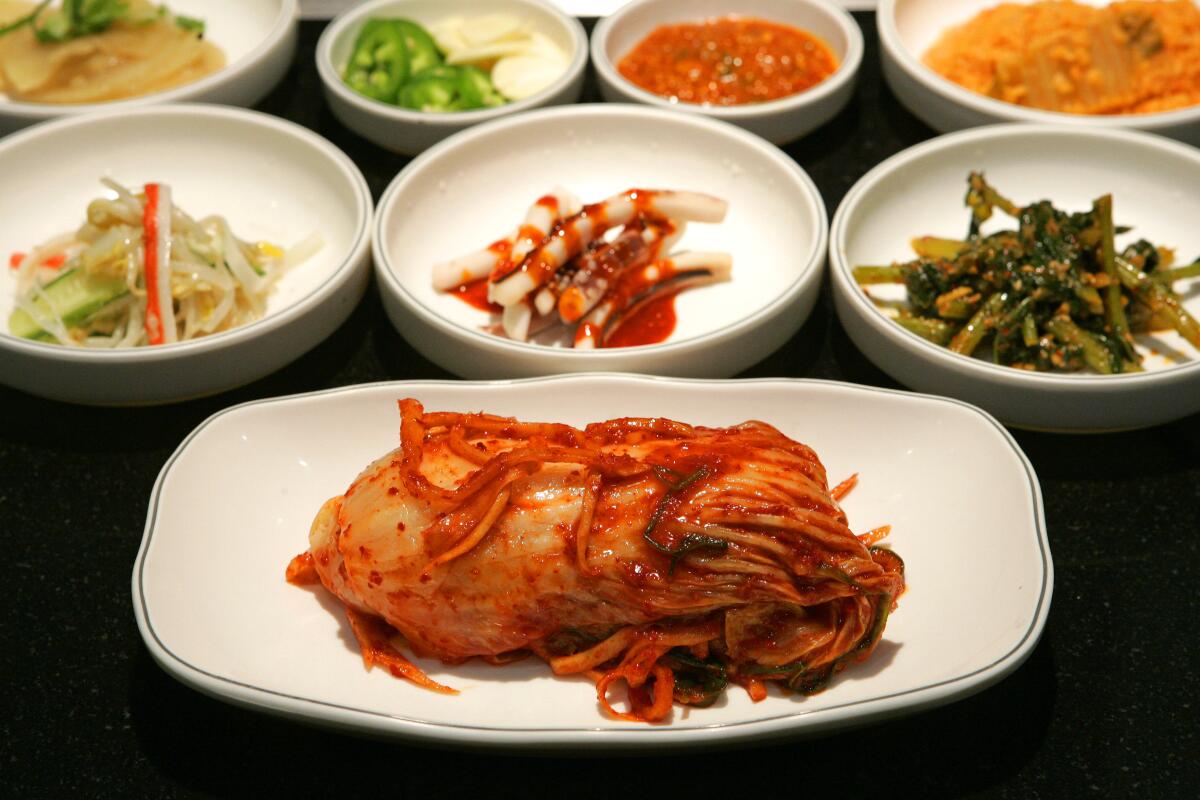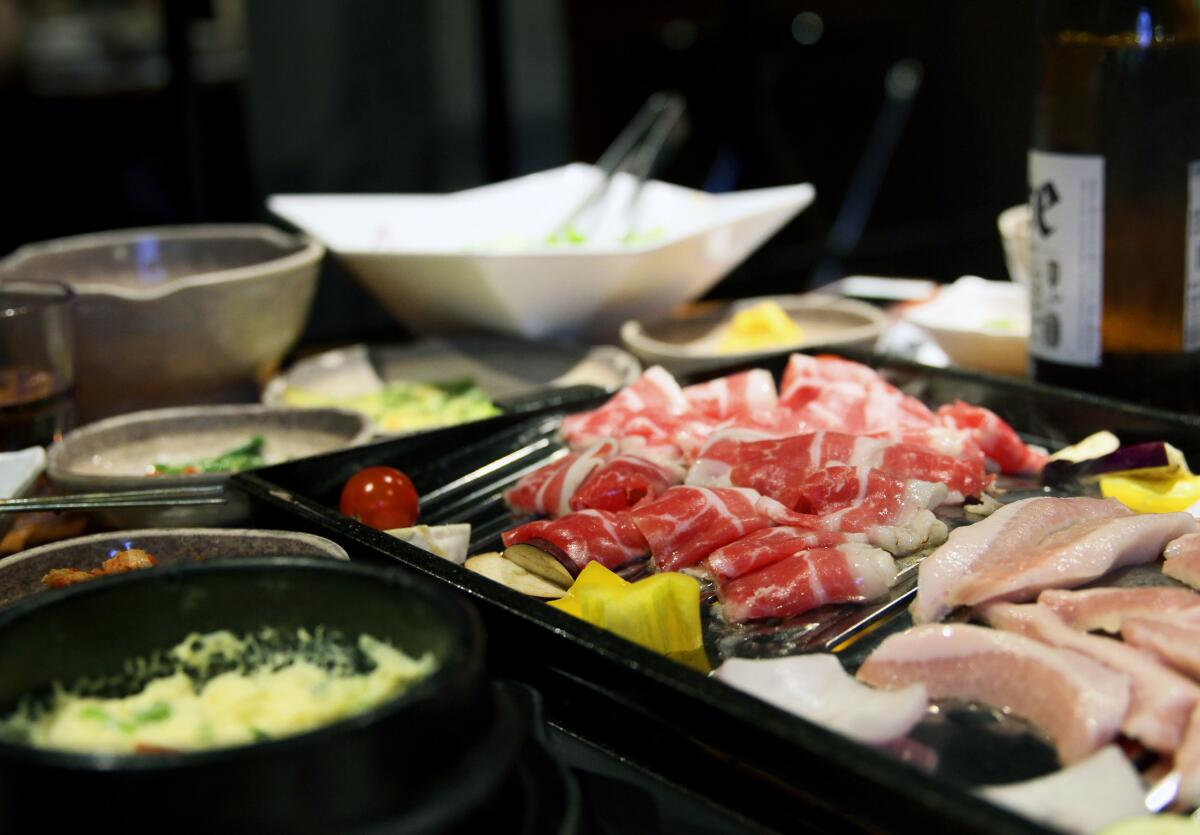The workers who make Korean barbecue possible deserve better

- Share via
If I’m celebrating something, I usually head to 6th Street in Koreatown for one of my favorite meals in this city: Korean barbecue, cooked at a tabletop grill and paired with an endless array of fresh side dishes and sauces.
I love the incredible variety of flavors and the restless energy of the meal; hands, scissors, chopsticks and plates in constant motion; always something to dip, sear, cut, wrap or chew. I even love the way the smell of the sweet, charred soy lingers on my clothes and hair afterward.
But recently I met some of the people who prepare the banchan, butcher and cook the meat and wash all of those tiny dishes, thanks to the Koreatown Immigrant Workers Alliance. They described a life of blatant wage theft, racial discrimination, constant stress, exploitation and job insecurity.
These issues aren’t unique to Korean barbecue restaurants or exclusive to the restaurant industry. A 2010 UCLA study found that 89% of wage workers surveyed in Los Angeles reported some type of workplace violation. Wage workers in Los Angeles lose an estimated $1.4 billion to wage theft every year, according to KIWA. The more vulnerable the workers, the more likely they were to be exploited — 38% of Latino workers and 36% of foreign-born workers surveyed experienced wage theft, compared with just 10.3% of white respondents and 16% of U.S.-born respondents.
KIWA and the workers say the restaurant they work at is under investigation by the California labor commissioner’s office. I decided to eat a meal there, consider their stories and see how it affected my experience.
I’ve decided not to name the restaurant primarily because the labor commissioner’s office has declined to confirm or deny any details of an ongoing investigation and hasn’t issued any citations. I’m eating there because though we often think morality is as easy as boycotting one bad actor and patting ourselves on the back, the harder thing is to sit with the truth: that every choice we make in an unjust economy is morally ambiguous.
We sit down at the restaurant on a recent weekday evening, and a few seconds later the table is populated with a buffet’s worth of dishes containing salad and banchan. These dishes are usually free and can be refilled an unlimited number of times. The cool, crunchy textures pair well with the heat of grilling meat, and there’s so much variety and quantity that I sometimes leave about half the dishes untouched.

But now I know that the restaurant loses a lot of money on banchan, and most of the time the employees aren’t even allowed to eat them. Some places offer as many as 24 side dishes, and now I think about who has to wash all of those dishes, each time, for every table, thousands of tiny plates every night — and again, when people ask for refills. I decided not to order seconds.
One dishwasher I spoke to offered to come in early and work longer hours so that it’d be easier to finish — but the owners refused to pay him for the extra time, so his only choice is to work faster. It’s a terrible job, but he has no choice. He has two elderly, ailing parents to support, a wife who needs expensive cancer treatments and children to raise. And he can’t speak English, so he needs to hold onto this job, which was arranged by a family member.
Platters of thinly sliced fatty brisket and marinated short rib arrive, and our waiter grills them for us, bending over at a 45-degree angle with one arm neatly tucked behind his back. We’ve been at the restaurant for five minutes and it’s the 10th time he’s visited our table to perform a task.

I’ve often been mesmerized by the way waiters at Korean barbecue manage multiple tables of grilling meat at various stages of doneness. They arrange meat around hotspots so it doesn’t burn, know exactly when to flip the galbi and and how to cut the pork belly into pieces to help it crisp up. I’d imagined this was a specialized job that required extra training and pays more. But the waiters I spoke to all pretty much learned on the job and get paid minimum wage plus tips, just like nearly every other worker in the restaurant.
Sometimes hours are missing from their paycheck, said Steven Chung, a former waiter who helped organize other workers to report labor violations. When employees started printing out their hours to show managers the missing pay, managers simply covered the computer and removed the print button, Chung said.
Midway through the meal, our server changes our charred, stained grill for a shiny fresh one. I think about how the cleaning solution for the metal grills is actually a type of acid that dishwashers say causes allergies, damages their hands and throws off fumes that make them choke. One dishwasher even got some of the acid in his eyes and went blind.
A slab of pork belly arrives, and for the first time I notice all of the tiny scores and slashes in the meat to help it cook quickly and evenly. The person doing all of that knife work also has to make the salads, mix sauces and marinades and prepare all the soups — all while a line stretches out the door and his boss screams at him to work faster.
It’s frustrating to be rushed like that, because sometimes workers are forced to take a two-hour break in the middle of their shift so their bosses don’t have to pay them for the full eight hours. Two hours, it turns out, is a spectacularly useless amount of free time for a wage worker. They can’t go home and see their family because most of them take the bus for 45 minutes to an hour to get to work. They can’t afford a meal at another restaurant in the neighborhood — not when it costs double what they make in an hour. Most of the time they just wait.
Many of the above practices violate labor laws, but violations are so widespread that labor agencies can’t begin to keep up. But eventually, the restaurant’s employees educated themselves about the law, encouraged each other to speak up, and brought the case to KIWA.

KIWA was formed in 1992 to address the exploitation of Korean and Latino workers in Koreatown. Today the group works on a broad platform of issues that affect Koreatown, including immigration reform, affordable housing and workers’ rights.
They help organize workers to report violations, hold public demonstrations outside businesses, host workplace law compliance sessions for business owners and disseminate literature about worker rights in multiple languages.
“We want to create higher expectations of ourselves and in the community, so that workers can go to work and feel respected and earn enough to take care of their families,” said Alexandra Suh, the group’s executive director.
In the past, their methods have sparked condemnations from Korean business owners accusing them of singling out Korean restaurants. Some have even accused them of being funded by North Korea. But their work has offered a necessary critique of Koreatown business practices.
In 1998, a federal probe of Koreatown restaurants found labor violations at all but two establishments. Korean business owners at the time defended their practices as the “Korean way of doing business.” Old-school Korean businesses, they said, were often run like families with the owners exercising a patriarch’s command over their employees. It’s more common to pay employees monthly without documentation of hours worked, and there’s little to no overtime, breaks or transparency.
It must be said that restaurant owners, many of whom began as wage workers themselves, say they struggle too. Even thriving places crowded with customers can go out of business. A recent article in the Korea Times featured business owners describe skyrocketing commercial rental rates brought on by international investment in the area. Businesses that appeared successful reported their rents being raised by greedy landlords.
It’s a cycle of exploitation that has its roots in what researchers call the enclave economy, which is just a fancy way of saying most immigrants experience a different economic reality. When you can’t speak English well, don’t have the right papers or your professional qualifications don’t translate, you often end up in low-wage jobs requiring manual labor — positions for which labor violations are more common.
A lot of immigrants find the easiest way out of a career in manual labor is to start their own businesses, and sometimes that’s a restaurant. But when other immigrants are your best customers, you keep prices low because you’re afraid other immigrants won’t or can’t afford to pay more.
And when prices are kept low but rents keep rising, you struggle to make rent and pay your workers. You don’t market your business to wider audiences because you don’t know how or can’t speak the language. And more generally, you don’t think people who aren’t from your culture would be interested in eating your culture’s food.
But I don’t think that’s the case anymore. Because this is Los Angeles, where the average person might have deep, simultaneous passions for Korean barbecue, tacos, pupusas, pho and sisig. And though I’ve been raised to appreciate a good deal, if higher prices meant the laborers who make this food could earn a living, I think there’s a lot of us who would gladly pay more if we can afford to.
And it’s long past time to for us consider how much suffering and toil goes into the $1 taco and $3 banh mi we love to celebrate. In college, my favorite Korean barbecue place was a tiny strip-mall bound $10 all-you-can-eat-style restaurant on Olympic Boulevard. I used take great pride in stretching that $10 for as many rounds of meat as possible, even scolding my friends for filling their bellies with low-cost water and rice. Now I wonder how the family who owns the place is doing, and what conditions their workers face.
At the end of the meal, the check arrives, and my pen hovers. I want to tip extra, thinking of the families these workers I’ve met are trying to support. But recently I learned that it’s common managers gather all of the tips and distribute them according to seniority and favoritism, and the kitchen is often left out. There’s no way to ensure my money goes to the people who need it the most.
I tipped 30% anyway. I don’t know how to solve the widespread, long-standing exploitation of our wage workers, but I know that placing a greater value on their work must be part of the answer.
More from Frank Shyong
More to Read
Sign up for Essential California
The most important California stories and recommendations in your inbox every morning.
You may occasionally receive promotional content from the Los Angeles Times.


















